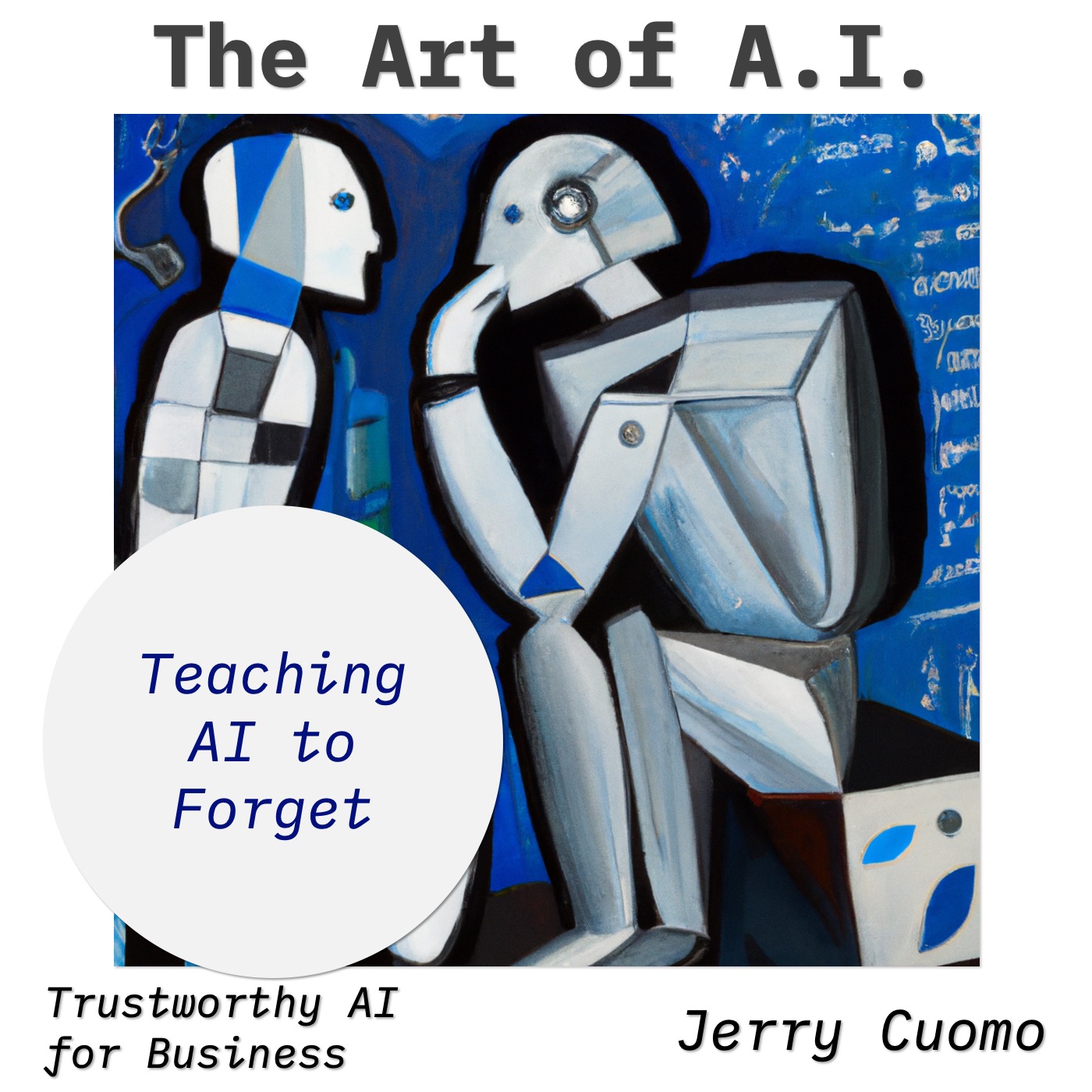Teaching AI to Forget
- 0.5
- 1
- 1.25
- 1.5
- 1.75
- 2
Speaker 1: You are listening to The Art of A. I. podcast, with your host, Jerry Cuomo.
Jerry Cuomo: Thank you, DJ. Hey folks, today we have a truly cool bonus topic, one in fact that I just wrote an article about and shared on Medium, and it's causing a little buzz out there. It's all about training AI to forget. So, joining me to discuss this topic, we have the fictional yet esteemed memory psychologist, Dr. Eva Rosenberg. Dr. Rosenberg, thank you for being on our show.
Dr. Eva Rosenberg: Thank you for having me, Jerry. This is a topic that intertwines neuroscience, ethics and computer science. How could I resist?
Jerry Cuomo: Exactly, and as I just told the audience, I recently wrote an article that talked about controlled forgetting in AI systems. It's more than just a technical issue. You see, it's about governance, ethics, and even legal settings. Think about GDPR. So do you think this idea has some resonance in your field of psychology?
Dr. Eva Rosenberg: Absolutely. You see, Jerry, forgetting isn't a failure of memory, it's a feature that allows our brain to operate more efficiently. So it's about time that AI learns to forget just like we do.
Jerry Cuomo: So I shared in my article about a small experiment I conducted called the neuralizer, and it was inspired by the movie Men in Black. This is a piece of code that I wrote that kind of makes AI forget, specifically certain terms or concepts. What are your thoughts on this?
Dr. Eva Rosenberg: The neuralizer, I like the concept, especially as a way to get us thinking. But Jerry, just make sure you don't aim it at me.
Jerry Cuomo: Yeah, yeah, sure. I'll try to refrain. But in all seriousness, this tool serves a greater purpose. It points to a future where businesses can comply with things like right to be forgotten. The neuralizer is just, and the code is available in GitHub, it's a bit of a hack, if I might say so myself. But as you said, it introduces the art of the possible and as a means to tee up the conversation and prompt more scientific work, along with some ethical conversations, right?
Dr. Eva Rosenberg: Yes, yes, that's important. As a psychologist, I study how us humans deal with our thoughts, the ones at the tick of our brain and the ones that get lost deep within. The neuralizer, as a tool to simulate memory and loss, is fascinating.
Jerry Cuomo: Yes, fascinating, for sure. And Eva, get this, I actually tested the neuralizer on myself, and this is how I did it. First, I prompted the AI and asked, " Who is Jerry Cuomo?" I guess I was flattered to see in its response that it knew who I was and roughly got it right. Then when prompted to comment on Jerry Cuomo again, but after applying the neuralizer, the AI came back with, " No matches found." I have to admit, Eva, when I saw that I had mixed emotions. On one level, it was cool that the experiment worked, but then I wondered ethically if I really should have that power.
Dr. Eva Rosenberg: Oh, so you tried to wipe Jerry off the AI map. Now, that's an interesting experiment, and yes, I would keep it restricted to your AI lab. But I'm curious, Jerry, what else did you learn? Did you find any limitations in your approach?
Jerry Cuomo: Yes. It's not a silver bullet. For example, when I tried generating low cholesterol dessert recipes by blocking high cholesterol ingredients, the results were hit- and- miss. But as a simple tool to just explore this type of controlled memory forgetting, it serves its purpose.
Dr. Eva Rosenberg: Well, we're all works in progress, aren't we? Both humans and AI.
Jerry Cuomo: Indeed, Eva. And there is so much ongoing research in this space, from interesting topics like machine unlearning to adaptive data deletion, and so much more. Well, we're running out of time. Any final thoughts on the importance of controlled forgetting?
Dr. Eva Rosenberg: Controlled forgetting seems to be a very important concept for evolving AI from being just a tool to becoming a responsible entity. It aligns with the progression in data science, ethics, and even psychology. Understanding AI memory, but the attribution of where the things that we learned came from, as well as helping us de- emphasize, or as you say, controlled forgetting, these are the two sides of the trustworthy AI coin. Keep it going, Jerry.
Jerry Cuomo: Thank you, Dr. Rosenberg, and thank you for those beautiful comments. And thank you for joining us on this episode of The Art of A. I. for business.
Dr. Eva Rosenberg: The pleasure was all mine, Jerry. Keep forgetting and keep learning.
Jerry Cuomo: Okay, folks, that wraps up part one of this episode, but there is something else, AI related of course, that's going on here, so let me fess up. Part one of this podcast is my playful attempt to draw attention to my recent article regarding controlled forgetting in AI, or machine unlearning, as some scholarly papers declare. So I've added a link to my article as well as a few of the standout research papers in this space. But part two was a feature on Dr. Eva Rosenberg. Now, in full transparency, the role of Eva was played by me with a little help from a tool called Respeecher. Let me explain. Respeecher is an AI startup known for enabling individuals to speak in other voices. It's founded in 2018 and they've gained recognition for their voice synthesis in various media, including a Super Bowl commercial, and they actually won an Emmy Award for their work on Richard Nixon's voice in a short film released in 2021. So folks, let me share a quick demo. Now, listen to a clip of my voice superimposed atop of the generated Dr. Rosenberg's voice. I was able to select the style of voice for Eva, ultimately settling in on an elder female with a Slovak accent. Listen in.
Dr. Eva Rosenberg: Oh, so you tried to wipe Jerry off the AI map. Now, that's an interesting experiment, and yes, I would keep it restricted to your AI lab.
Jerry Cuomo: Oh, so you tried to wipe Jerry off the AI map. Now, that's an interesting experiment, and yes, I would keep it restricted to your AI lab. Pretty impressive, huh? The Respeecher team has also collaborated with Disney on projects like Obi Wan Kenobi and The Mandalorian, and they used AI to sample and recreate voices of the likes of James Earl Jones, of course, as Darth Vader, and Mark Hamill as Luke Skywalker. Now, I particularly like these guys because they seem to be striking a balance in generative AI innovation as well as responsible release of AI. So to compliment their technology, they're pioneering ethical use of synthetic voices by requiring permissions to clone voices, and they've also been investing in guardrails that include a synthetic speech detector and audio watermarking. Pretty cool stuff. I've put links in for Respeecher as well, so check it out. Okay folks, that's it for today, and I'd like to thank you all for your continued support and interest in these podcasts. This is Jerry Cuomo, IBM fellow and VP for technology at IBM. See you again on an upcoming episode.
DESCRIPTION
In this bonus episode, host Jerry Cuomo explores the intriguing concept of "Training AI to Forget." Joined by 'guest' Dr. Eva Rosenberg, a fictional memory psychologist portrayed using voice synthesis tech, they discuss the intersection of neuroscience, ethics, and computer science in AI. Jerry shares insights from his recent article and introduces "The Neuralyzer," a code experiment that enables AI systems to forget specific terms or data, aligning with governance and ethical considerations like GDPR.
In a surprising twist, Jerry reveals that the role of Dr. Eva Rosenberg was performed by him using technology from Respeecher, an AI startup known for voice synthesis. The episode explores how Respeecher responsibly navigates the ethical landscape of synthetic voices.
This episode serves as a thought-provoking journey into the future of trustworthy AI, examining both the technological and ethical dimensions. Listen now to get inspired and educated about the next frontier in AI governance.
Key Takeaways:
- [00:31 - 00:47] Intro Dr. Eva Rosenberg
- [01:17 - 01:28] Forgetting is a feature
- [02:45 - 03:24] The Neuralyzer
- [04:03 - 04:17] Ongoing Research
- [05:11 - 05:42] I'm Eva
- [05:43 - 06:04] Respeecher
- [06:24 - 06:34] Simulation
- [07:03 - 07:19] Ethical use of synthetic voice
References:
Art of AI Article Series - Training AI to Forget: The Next Frontier in Trustworthy AI
Art of AI Github Repo (neuralizer.py) source code
Towards Making Systems Forget with Machine Unlearning
Selective Forgetting in Deep Networks
* Coverart was created with the assistance of DALL·E 2 by OpenAI. ** Music for the podcast created by Mind The Gap Band - Cox, Cuomo, Haberkorn, Martin, Mosakowski, and Rodriguez








